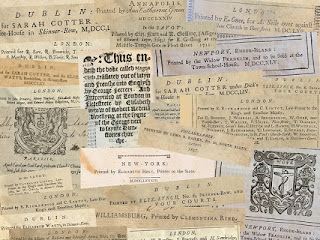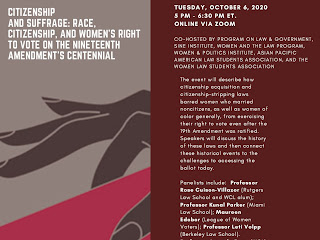Linda C. McClain, Boston University School of Law, recently has posted two articles. The first is What Becomes a Legendary Constitutional Campaign Most? Marking the Nineteenth Amendment at One Hundred, which is forthcoming in the Boston University Law Review 100 (2020): 1753-1769
What most becomes a landmark anniversary in the legendary campaign by women (and some men) for woman suffrage that, in 1920, led to Congress’s ratifying the Nineteenth Amendment to the U.S. Constitution? This framing of the question alludes to the famous, decades-long Blackglama advertising campaign, “What becomes a legend most?,” which (beginning in 1968) enlisted the charisma of famous women (and some men) to glamorize mink coats. This Essay also appeals to the dual meanings of legendary -- “of, relating to, or characteristic of legend” and “well-known, or famous” -- and argues that the campaign for woman suffrage is the stuff of legend in both senses. This is evident in challenges surrounding how best to represent the anniversary in public monuments (such as the recently unveiled Women’s Rights Pioneers Monument in New York City's Central Park) and public exhibitions: Which legendary suffragists are included? Who is left out? What role do legends play in the commemoration? The abundance of invocations of “the Nineteenth” in the buildup to 2020 and in the commemoration itself suggests multiple answers about how best to commemorate it. Some answers look back in time, urging critical reflection on what we do and do not really know about the campaign for woman suffrage and insisting that a deeper, intersectional examination teaches sobering but necessary lessons about inclusion and exclusion and the challenges of coalition building. Such examination also yields valuable role models of agency and action to inspire action in present-day struggles for women’s rights. Other answers focus on the present day and unfinished business: the next hundred years should bring a renewed commitment to advancing women’s political power in the next century, in particular, that of Black women, who stand out for their high levels of political participation yet who have not received sufficient party encouragement and resources as candidates for office. Another forward-looking answer urges attention to how gendered models of who should be a political leader and stereotypes about race and gender work against women’s full participation in governance. This Essay comments on these and other answers offered by the contributors to a symposium in the Boston University Law Review on the centenary of the Nineteenth Amendment: Professors Nadia Brown and Danielle Casarez Lemi, Lolita Buckner Inniss, Kelly Dittmar, Paula Monopoli, Virginia Sapiro, and Katharine Silbaugh.
The second article is her contribution to that symposium, A "Woman's Best Right" - To a Husband or the Ballot?: Political and Household Governance in Anthony Trollope's Palliser Novels:
The year 2020 marks the one hundredth anniversary of the ratification of the Nineteenth Amendment to the U.S. Constitution. In 2018, the United Kingdom marked the one hundredth anniversary of some women securing the right to vote in parliamentary elections and the ninetieth anniversary of women securing the right to vote on the same terms as men. People observing the Nineteenth Amendment’s centenary may have difficulty understanding why it required such a lengthy campaign. One influential rationale in both the United Kingdom and the United States was domestic gender ideology about men’s and women’s separate spheres and destinies. This ideology included the societal premise where the husband was the legal and political representative of the household and extending women’s rights—whether in the realm of marriage or of political life—would disrupt domestic and political order. This Article argues that an illuminating window on how such gender ideology bore on the struggle for women’s political rights is the mid-Victorian British author Anthony Trollope’s famous political novels, the Palliser series. These novels overlap with the pioneering phase of the women’s rights campaign in Britain and a key period of legislative debates over reforming marriage law. This Article looks at how the Woman Question (as mid-Victorians called it), including the question of women’s political rights, featured in these novels. In his fiction and nonfiction, Trollope expressed decided views about the Woman Question, insisting that a woman’s “best right” was the right to a husband, rather than to the ballot or greater employment. However, the evident tension between such views and the rich portraiture of Trollope’s female characters—including in the Palliser series—suggests an intriguing dialectic between espousing and subverting Victorian ideals about womanhood. Examining the first three novels in the series,
Can You Forgive Her?,
Phineas Finn, and
Phineas Redux, this Article shows how they link matters of public power and political rule to private power and household rule. The novels gesture toward parliamentary debates over the Woman Question, but, by comparison with Trollope’s detailed creation of parliamentary debates with real-world parallels, do not include debates over woman suffrage or the various marriage law–reform bills that failed or succeeded. Even so, this Article shows that the characters in the Palliser novels are mindful of, and constrained by, the marriage law of the time, including husbandly prerogatives of household rule, wifely duties of obedience, and women’s limited options for exiting a troubled marriage. Through analyzing the various marital relationships formed in these novels, as well as other familial relationships and friendships, this Article identifies how legal and social rules about gender roles shape the characters’ connections to political and household power. Trollope’s female characters act in a social context in which marriage is the expected “career” for women, even as some of them experience ambition for a political career or occupation other than—or in addition to—marriage. The novels also explore women’s limited ability to exit disastrous marriages, even as they include examples of relatively egalitarian marriages that seem to transcend models of husbandly rule and wifely submission. This Article’s close reading of the novels is augmented by literary criticism on Trollope and some contemporaneous writings by nineteenth-century feminists, which provide a counter to Trollope’s portrayal of the feminist positions in the Palliser novels. Because Trollope believed that his novels taught important moral lessons about love, marriage, and the legal and political issues of his day, this Article also considers how Trollope’s complicated stance toward the Woman Question shaped the lessons taught in the Palliser novels.
--Dan Ernst








